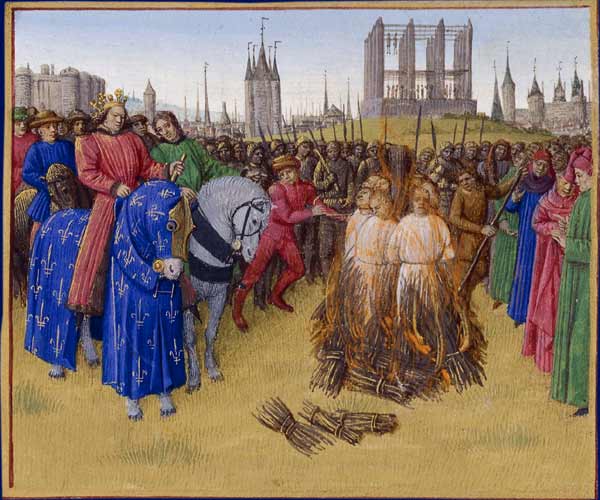Religious Persecution

"It is very interesting to notice how far later
tradition has exaggerated the Victorian dispute [about evolution]
and distorted our view of its nature. As James Moore
has shown, it certainly did not appear at the time as
raging between science and religion, but as cutting
straight across both. Darwin's most serious opponents
by far were the official scientific establishment
of his day, and many of his supporters...
were clergymen." -- Mary Midgley, Evolution as Religion, p. 12
The Greats of the Scientific Revolution...
To a man (sorry, in those days they were all men), all thought like this:
The chief aim of all investigations of the external world
should be to discover the rational order and harmony which
has been imposed on it by God and which He revealed to us in
the language of mathematics... Just as the eye was
made to see color and the ear to hear sounds, so the
human mind was made to understand quantity.
-- Johannes Kepler
The success of science was yet more proof of the
reality of God, and was in no way seen to be in conflict
with religion. That sense of conflict only arose in
the nineteenth century, and the reasons were not scientific,
but political: progressive politics was (often) anti-religious,
and scientists did not wish to seem backwards in their politics!
The Myth of Religion versus Science
I've been listening to a series of lectures by Professor Frederik Gregory.
One of the interesting points he makes,
a number of times during the lectures,
is that research by historians of science has shown that the idea of
a long-standing conflict between religion and science is something that
has been read back into the past by modern intellectuals.
Of course, there were incidents where some particular scientist ran
afoul of some particular religious body (like Galileo).
But, basically, until the mid-19th century,
just about no scientists or religious people understood
the two to be at conflict in some fundamental way.
Most scientists talked of how their findings "showed the glory of God"
-- and for the most part, this was not just for show,
as most of them were genuinely devout.
(Newton, for instance, spent more of his life on Bible studies
than he did on physics or mathematics.)
Furthermore, Gregory notes,
the change in this view did not originate with science,
but with the political radicals of the mid-19th century,
who persuaded the younger scientists of the time that to be
"progressive" one ought to be materialistic and atheistic.
It was only then that the exact same sort of findings that,
a generation before,
would have displayed the glory of God, now were seen
as indicating his non-existence!
The Scores of Scientists Who Suffered Severely at
the Hands of the Church for Their Theories Include?
I once found a very bright fellow, but not an historian, asserting:
"That many of the most illustrious members of this tiny group
[of Scientific-Revolution thinkers] suffered severely at the hands of
religious persecutors is (or ought to be) notorious."
Here he is expressing a bit of "folk history"
that just doesn't have much basis in fact.
My interest is really about why this idea continues to circulate.
One of the first things our history of science lecturer at King’s College,
John Milton, told us was that on the vast majority of scientific topics,
the church simply did not care.
So when Buridan
and Oresme
challenged Aristotelian mechanics: the church just did not care at all,
one way or the other.
Secondly,
on the very few topics it did care about,
it was always prepared to regard scripture as figurative,
if the literal interpretation could be proven false.
(So,
since everyone knew the earth was round,
the church had done this with the biblical passage mentioning its "four corners":
this was just figurative speech.)
Thus, with Galileo, church astronomers examined his
evidence and found it wanting.
(Which it was, frankly: for instance,
he thought the tides were caused by the earth’s
rotation throwing the seas around, and that they had a 24-hour cycle.
And Brahe's heliocentric theory accounted for the phases of Venus.
Of course, Galileo was right,
but he hadn't proved his case.)
Thus they asked him to present heliocentrism as an hypothesis.
He agreed, but then reneged,
in a book in which he called the current Pope a simpleton.
At that point he was subject to a fairly mild house arrest.
(I think that was a mistake,
but it is good to be clear on just what transpired.)
Giordano Bruno was burned at the stake,
but for heretical religious views,
not for his scientific ideas, and he was not an important
figure in the Scientific Revolution anyway.
(Again, I am not in favor of death for religious heresy,
but this incident has nothing to do with persecuting scientists.)
Aside from those two,
what important figures in the Scientific Revolution
"suffered severely" at the hands of a Catholic
or Protestant church for their views? Copernicus? No,
the church never bothered him at all.
Kepler? No, he suffered some by being in the
midst of the religious warfare of the Reformation,
but no one hindered his scientific work.
Descartes? Nothing.
Newton? Zilch.
Boyle? Niente di niente.
Hooke? Nada.
Malebranche? Well,
he was actually a priest,
but he did have one work placed on the index of forbidden books.
Huyghens? Died peacefully in his bed,
never molested by any church.
Halley? No.
Leibniz? No persecution I know of.
And yet, the idea still floats around that many
of the leaders of the Scientific Revolution
"suffered severely" at the hands of the church.
This ought to be notorious.
